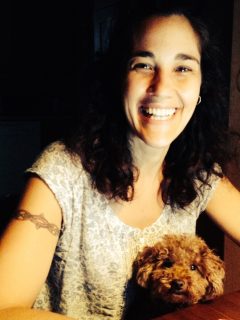By Sophie Tamas
It is a week since the world turned upside down here, in small-town Canada. At some point in the past few weeks, or next few, it will be turning upside down where you are, too. There is nothing quite like a pandemic to remind us of our shared precarity.
I know better but I can feel myself reaching for the silver lining in this cloud. This surfaces in questions like, I wonder what Covid-19 is doing to reduce carbon emissions? How long before someone uses it as an example of ‘agential matter?’ Maybe this is how we’ll get off oil or flatten the population curve? Maybe the social determinants of health will gain enough weight to crush neoliberalism? How many white bodies and bankruptcies would it take? Such cold questions. I am scrambling for analytic arms-length breathing room even though my teaching is about all the feels. What’s going on is so interesting (terrifying), I want to become a video camera (not be here), watching everything so I can think about it later because nothing makes sense.
I keep trying to make sense and use of loss. I doubt that it works, so that is not what I want to do here. I want to invite language to move differently.
I am always a little embarrassed now when I make a refence to trauma literature from the Holocaust. It’s so rarely the right time and place. Even among scholars it can end the conversation, like unnecessary flexing in the misery Olympics. This says a lot about my shame issues and nothing about the literature itself, which I am (of course) about to cite.
Early in my PhD I read a chapter in which Shoshana Felman discusses the work of Paul Celan, a Jewish poet who wrote about the camps. She offered his explanation of what he thought writing was for, what it was doing, why people felt compelled write. His answer was long. I’m going to cite a good chunk of it. He says:
“within reach, close and not lost, there remained, in the midst of the losses, this one thing: language. …but it had to pass through its own answerlessness, pass through a frightful falling mute, pass through the thousand darknesses of death-bringing speech. It passed through and yielded no words for what was happening – but it went through those happenings. Went through and count come into the light of day again, ‘enriched’ by all that.
In this language I have sought… to speak, to orient myself, to explore where I was and was meant to go, to sketch out reality for myself.
This, you see, was event, movement, a being underway, an attempt to gain direction…
These are the efforts of someone coursed over by the stars of human handiwork, someone also shelterless in a sense undreamt-of till now and thus most uncannily out in the open, who goes with his very being to language, stricken by and seeking reality’ (cited in ‘Education and crisis,’ 1995, p. 34).
This is the kind of writing that I am hoping will emerge if I hold still long enough, even if it’s a little embarrassing. Asking language to make sense of events that defy comprehension forces it away from the experience that we set out to describe. I don’t have enough headspace to get an arms-length look at anything and writing as if I know what’s going on, to get outside of it, won’t help. It’s too immersive. The storm is here, or at your neighbour’s house, coming soon, or maybe not.
This is the kind of writing that I intend to do but these days I spend more time sitting with my hands on the keyboard, waiting. All I can grasp is a handful of fragments. All the words seem wrong, even these ones. I find other somethings-to-be-done (baking bread, making lists, micro-managing my eyebrows).
I can’t know this by myself. That is why I wanted to make this site. I want us to huddle together like the stoners used to behind the high school, making a protected space between their bodies to get a match lit.
But even now, leaning over my words too late on Friday night, I am wondering if they’re worth posting, as measured by whether or not this makes sense.
